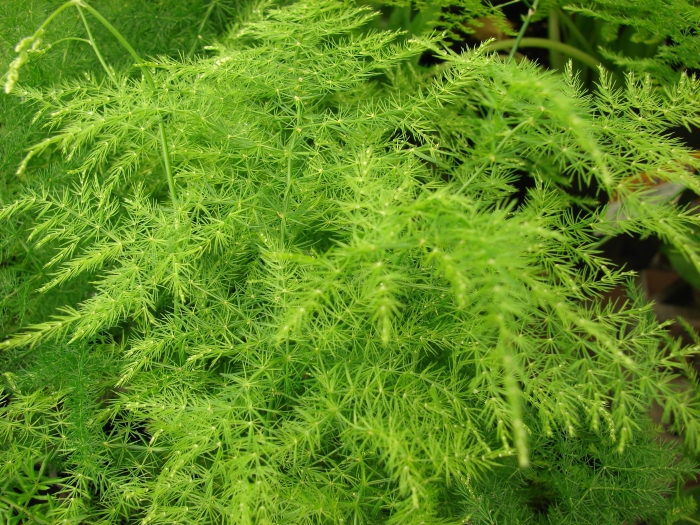Common Asparagus Fern
(Asparagus setaceus)
Common Asparagus Fern (Asparagus setaceus)
/
/

Forest & Kim Starr
CC BY 3.0
Image By:
Forest & Kim Starr
Recorded By:
Copyright:
CC BY 3.0
Copyright Notice:
Photo by: Forest & Kim Starr | License Type: CC BY 3.0 | License URL: https://creativecommons.org/licenses/by/3.0 | Uploader: BotMultichillT | Publisher: Wikimedia Commons | Title: Starr_080117-1771_Asparagus_setaceus.jpg | Notes: {{Information |Description= Hart's Tongue Fern |Source=self-made |Date=21-12-07 |Author= [[User:Rosser1954|Rosser1954]] |Permission= |other_versions= }} |


















































Estimated Native Range
Summary
Asparagus setaceus, commonly known as Common Asparagus Fern, is a scrambling perennial herb native to the coastal thickets and forests of southern Africa. It features tough green stems and feathery foliage that can reach several meters in length. The plant is adorned with sharp barbed thorns along the stem. From spring to autumn, it produces small greenish-white bell-shaped flowers, each about 0.4 cm long, which are followed by small green berries that turn black upon maturity. Despite its common name, Asparagus setaceus is not a true fern; its fern-like leaves are actually modified stems called cladodes.
The Common Asparagus Fern is valued for its lush, feathery foliage, which adds texture to garden compositions and is popular in floral arrangements. It is a versatile plant, often used in hanging baskets, as ground cover, or as a houseplant. It is hardy and adapts readily to cultivation, requiring part shade and medium amounts of water. It thrives in a variety of soil types with different drainage speeds. However, it can be potentially invasive in some regions, so gardeners should check local guidelines before planting.CC BY-SA 4.0
The Common Asparagus Fern is valued for its lush, feathery foliage, which adds texture to garden compositions and is popular in floral arrangements. It is a versatile plant, often used in hanging baskets, as ground cover, or as a houseplant. It is hardy and adapts readily to cultivation, requiring part shade and medium amounts of water. It thrives in a variety of soil types with different drainage speeds. However, it can be potentially invasive in some regions, so gardeners should check local guidelines before planting.CC BY-SA 4.0
Plant Description
- Plant Type: Shrub, Herb
- Height: 1-3 feet
- Width: 1-3 feet
- Growth Rate: Moderate
- Flower Color: N/A
- Flowering Season: Spring, Summer, Fall
- Leaf Retention: Evergreen
Growth Requirements
- Sun: Part Shade
- Water: Medium
- Drainage: Slow, Medium, Fast
Common Uses
Bee Garden, Bird Garden, Butterfly Garden, Deer Resistant, Drought Tolerant, Fragrant, Low Maintenance, Potted Plant
Natural Habitat
Coastal thickets and forests of southern Africa
Other Names
Common Names: Lace Fern, Climbing Asparagus, Ferny Asparagus, Asparagus Fern, 文竹
Scientific Names: , Asparagus setaceus, Asparagus plumosus, Protasparagus setaceus, Protasparagus plumosus, Asparagus zanzibaricus, Asparagus plumosus subsp. nanus, Asparagus plumosus var. tenuissimus, Asparagopsis setacea, Asparagus asiaticus subsp. amharicus
GBIF Accepted Name: Asparagus setaceus (Kunth) Jessop